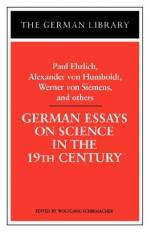|
This section contains 633 words (approx. 3 pages at 300 words per page) |

|
World of Scientific Discovery on Paul Ehrlich
Through his comprehensive study of the effects of chemicals in the human body, Ehrlich fathered the fields of chemotherapy (the treatment of disease with chemical agents) and hematology (the study of blood). He also made important contributions to the understanding of immunity and discovered Salvarsan, the first effective treatment for syphilis.
Ehrlich was born on March 14, 1854, in Strehlen, Silesia (then part of Germany), to a prosperous Jewish family. He was the son of Ismar Ehrlich and his wife, Rosa, the aunt of bacteriologist Karl Weigert. Ehrlich's interest in biology and chemistry led him to study medicine. He attended universities in Breslau, Strasbourg, Frieberg-im-Briesgau, and Leipzig, earning his medical degree in 1878. Ehrlich was fascinated by the reactions of cells and tissues to dyes. Using aniline dyes, for example, Ehrlich investigated white blood cells. In the process, he developed new ways of staining cells for research, including the methylene blue...
|
This section contains 633 words (approx. 3 pages at 300 words per page) |

|


